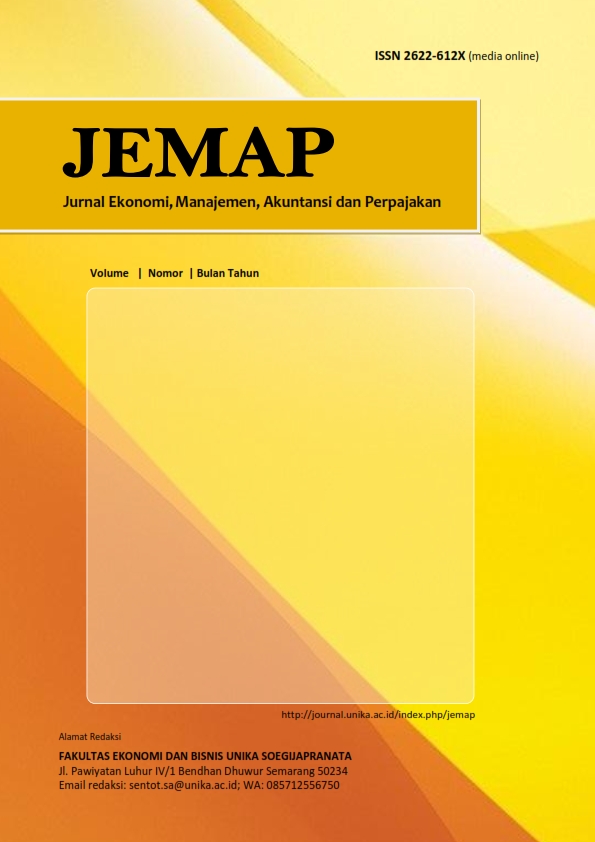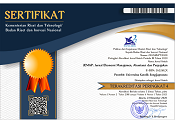Exploration of Non-compliance of Micro, Small and Medium Business Taxpayers: Phenomenology Study
Abstract
This study aims to describe the meaning of non-compliance with taxes, especially for taxpayers of small and medium enterprises. The background of this research is that there is a phenomenon that is not all taxpayers' fulfill their tax obligations in accordance with the provisions of tax regulations. Resistance that occurs in carrying out tax obligations depends on how tax interpreters interpret non-compliance. This study used a qualitative approach with the Schutz interpretive phenomenology as a research method. The phenomenology method focuses on the object of exploration to gain knowledge. Data was obtained through interviews with small business taxpayers. This study found the motives of taxpayers in carrying out their tax obligations. Which consisted of six elements, namely: situations those were dilematic, opportunistic, distrust, injustice, not willing, and saving yourself. The motive must be found first, because based on Schutz's interpretive phenomenology method, someone will interpret something depending on the motive in interpreting something. From the motives that have been known, it can be concluded that in order to carry out their tax obligations, taxpayers need trust, both for the government, and for God.
Keywords
Full Text:
PDFReferences
Alm, J., Kirchler, & Muehlbacher. (2012). Combining psychology and economics in the analysis of compliance: From enforcement to cooperation. Economic Analysis & Policy, 42 (2), 133-155.
Aneswari, YR, Darmayasa, IN, & Yusdita, EE (2016). Critical perspective for implementing 1% income tax on msmes. Published manuscript, Malang.
Anjani, DN, & Restuti, MMD (2016). Analysis of factors of individual taxpayer compliance with business actors at primary tax office in Salatiga. Indonesian Accounting and Finance Period, 1 (2), 125-144.
Hanefah, M., Ariff, M., & Kasipillai, J. (2014). Compliance costs of small and medium enterprises. Journal of Australian Taxation, 4 (1), 73-97.
Hasseldine, D., & Bebington, KJ (1991). Blending economic standards and fiscal psychology models in design of responses to tax evasion: The new zealand experience. Journal of Economic Psychology, 12 (2), 299-324.
Hendri, N. (2016). Factors affecting taxpayer compliance in paying taxes for public service in metro city. AKUISISI Journal, 12 (1).
Imaniati, ZZ (2016). The influence of taxpayer perceptions on the application of pp no. 46 of 2013, understanding of taxation, and tax sanctions against compliance with taxpayers of micro, small and medium enterprises in the city of Yogyakarta . NOMINAL JOURNAL, V (2), 123-135.
Kartini, NKB, Yuniarta, GA, & Sujana, E. (2017). Analysis of the level of understanding of small and medium industry taxpayers on the implementation of a self assessment system in implementing tax obligations . S1 Ak e-Journal University of Education Ganesha, 8 (2).
Lubis, USA (2015). Management of Sources of Tax Revenue as a Main Source of Funding in Development.
Mangoting, Y. (2016). Domino as a concept of tax fraud: Phenomenology study. Brawijaya University, Malang.
Mohdali. (2013). The influence of religiosity on taxpayers' compliance attitudes: Empirical evidence from a mixed-methods study in Malaysia. Accounting Research Journal, 27 (1), 71-91.
Moleong, LJ (2005). Qualitative Research Methodology. Bandung: PT Remaja Rosdakarya.
Moustakas, C. (1994). Phenomenological Research Methods. Thousand Oaks City: SAGE Publications Inc.
Mukaromah, A. (2012). Tax Interpretation and Its Implications According to the Taxpayer's Perspective of Micro, Small and Medium Enterprises. Published manuscript, Surakarta.
Mutiah, M., Harwida, GA, & Kurniawan, FA (2011). Tax interpretation and its implications according to the taxpayer's perspective of micro, small and medium enterprises (An interpretive study). Paper presented at the National Symposium on Accounting for XIV Aceh.
Tax, DJ (2016). Performance Report.
Panggabean, H., Tirta, H., & Muniarti, J. (2014). Local wisdom of global excellence. Jakarta: Elex Media Computindo.
Parks, CD, & Vu. (1994). Social dilemma behavior of individuals from highly individualist and collectivist cultures. The Journal of Conflict Resolution, 38 (4), 708-718.
Government Regulation Number 46 of 2013 concerning Procedures for Calculating, Depositing and Reporting on Income Taxes from Businesses Received or Obtained by Taxpayers with Certain Gross Circulations.
Pope, J. (2012). The effects of religiosity and external environment on tax compliance voluntary. New Zealand Journal of Taxation Law and Policy, 18, 119-139.
Rohman, A., Zulaikha, Raharjo, SN, &Harto, P. (2011). Study of the capability of bookkeeping of small and medium enterprises (SMEs) in supporting taxpayer compliance principles. Journal of Accounting, XV (03).
Ross, ML (2004). Lead to representation does taxation? British Journal of Political Science, 34 (2), 229-249.
Sari, DP (2013). Examine the treatment of the theory of micro, small and medium enterprises. Multiparadigm Accounting Journal, 4 (2), 165-329.
Schutz, A. (1972). The phenomenology of the social world. London: Heinemann Educational Books.
Togler, B. (2002). Speaking to theorists and searching for facts: Tax morale and tax compliance in experiments. Journal of Economic Surveys, 16 (5), 657-683.
Waluyo. (2014). Indonesian taxation. Jakarta: Salemba Empat.
Welch, MR, Tittle, CR, & Petee, TA (1991). Religion and deviance among adult catholics: A test of the "moral communities" Hypothesis. Journal for the Scientific Study of Religion, 30 (2), 159-172.
Laws References
Law No. 28 concerning General Provisions and Procedures for Taxation (2007).
Law Number 36 concerning Income Tax (2008).
DOI: https://doi.org/10.24167/jemap.v4i2.3320
Refbacks
- There are currently no refbacks.
e-ISSN 2622-612X | View My Stats







